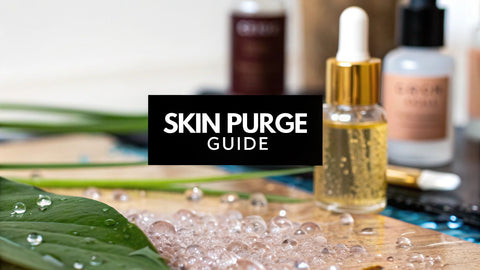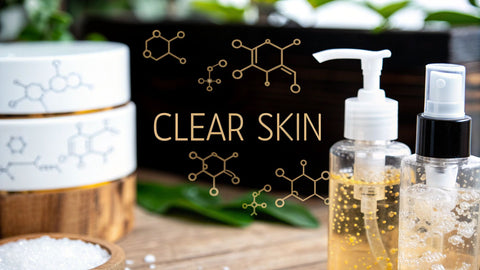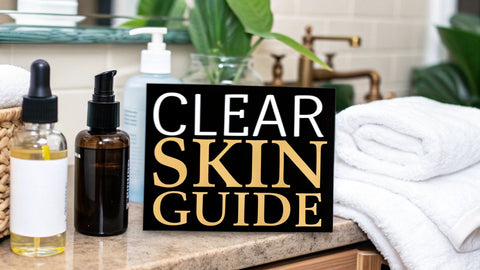Your Guide to Using an Acne Sulfur Wash

An acne sulfur wash is a medicated cleanser where sulfur is the star of the show. It's the primary active ingredient used to tackle breakouts, and it's often a go-to recommendation for people with oily, combination, or even sensitive skin who find other acne treatments just too harsh.
The Underrated Power of Sulfur for Stubborn Acne
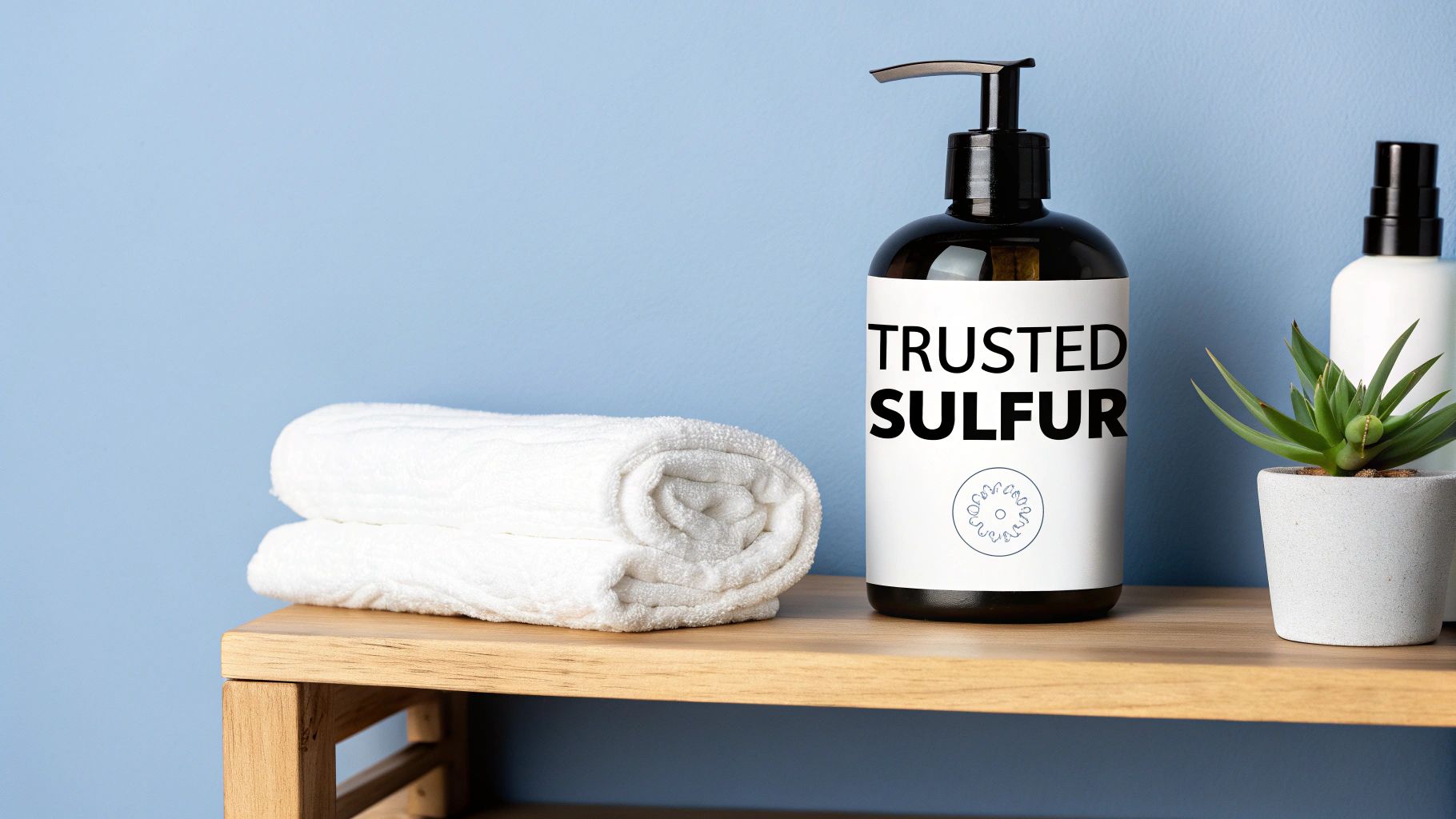
If you feel like you've run the gauntlet of acne products with little to show for it, you're not alone. The skincare aisle is packed with aggressive chemicals that often overpromise and underdeliver, sometimes leaving your skin more irritated than when you started. That's why it's time to turn our attention back to a classic, effective ingredient that often gets lost in the noise—sulfur.
Acne sulfur washes are making a serious comeback, and for good reason. They stand out as a gentler, yet surprisingly potent, alternative to the usual suspects. Think of sulfur not as a sledgehammer against your skin, but as a calm negotiator that works with your skin's biology to de-escalate breakouts. It’s a reliable choice for managing acne without the collateral damage of excessive dryness or redness.
Why Sulfur Is Such a Smart Choice
For decades, sulfur has been a trusted staple in the dermatology world. Its natural properties make it uniquely equipped to handle several of the key factors that lead to acne. Modern science has only refined this ancient remedy, allowing today's brands to formulate powerful products that actually feel good on the skin.
The real magic is in the formulation. When sulfur is combined with other beneficial ingredients, its positive effects are amplified while potential downsides—like that old-school medicinal scent—are minimized. This is where advanced skincare science really shines.
At Neutralyze, we are experts in ingredient science. Our philosophy is built on harnessing the inherent power of key actives like sulfur and pairing them with synergistic compounds to deliver clear, calm skin without compromise. We don't just sell products; we provide intelligent, science-backed solutions for persistent acne.
The Modern Spin on an Ancient Ingredient
Forget any outdated ideas you might have about sulfur treatments. The sulfur wash of today is worlds away from the harsh, smelly concoctions of the past. Companies like Neutralyze have perfected the art of creating sophisticated cleansers that are both powerful and elegant to use. By carefully selecting complementary ingredients, we can offer a complete solution that addresses not just current blemishes but also the overall health and balance of your skin.
A well-formulated acne sulfur wash should do three things really well:
- Cleanse Effectively: It needs to remove all the daily grime, oil, and impurities without stripping your skin's natural moisture barrier.
- Target Acne at the Source: The formula must actively work against the root causes of breakouts, not just the surface-level symptoms.
- Soothe the Skin: A great wash will leave your skin feeling calm and comfortable after you rinse—never tight, dry, or irritated.
It's this careful balance that makes modern sulfur products so effective. Instead of just waging a war on acne, they support your skin’s journey back to a healthy, neutral state. For anyone wrestling with stubborn breakouts, that subtle shift makes all the difference.
How Sulfur Actually Fights Breakouts
If you're picturing sulfur as some harsh, one-trick pony for acne, it’s time for a new perspective. Think of it less like a sledgehammer and more like a skilled technician for your skin. It doesn't just blast away blemishes; it methodically tackles the root causes of breakouts from a few different angles at once.
This multi-faceted approach is precisely why sulfur has been a trusted skincare staple for generations, especially for those whose skin just can't handle the more aggressive stuff. It’s a strategic, three-pronged attack designed to bring your skin back into balance.
The Pore Declutterer
Let's start with the #1 cause of most breakouts: clogged pores. When dead skin cells hang around for too long, they mix with your skin's natural oils and create a stubborn plug. This is the starting point for everything from blackheads to angry red pimples. Sulfur's first job is to act as a gentle keratolytic—a fancy way of saying it breaks down the gunk.
Imagine it as a tiny, diligent manager for your pores. Sulfur works by softening and dissolving keratin, the protein that acts like glue, holding those dead skin cells together.
- It gently encourages the oldest layer of skin to loosen up and shed away on schedule.
- This keeps the pathways of your pores clear, preventing that microscopic traffic jam before it starts.
- By doing this, it helps stop new blemishes from ever getting a chance to form.
This is a much kinder, gentler process than a gritty physical scrub or a heavy-duty chemical peel, which is why a sulfur wash is so well-suited for daily use without leaving your skin feeling raw or irritated.
The Bacterial Gatekeeper
Clogged pores are only half the story. The real trouble starts when bacteria, specifically Cutibacterium acnes (formerly P. acnes), gets involved. This bacteria lives on everyone's skin, but when a pore gets blocked, it creates the perfect oxygen-free party house for it to multiply like crazy. This bacterial overgrowth is what triggers inflammation—the redness, swelling, and soreness of a classic pimple.
Here, sulfur plays the role of a gatekeeper. As a natural antibacterial and antifungal agent, it makes the skin a less inviting place for C. acnes to thrive. It doesn't try to sterilize your skin; it just helps keep the bacterial population in check so it doesn't get out of control. This is key to preventing a simple clog from escalating into an inflamed, painful breakout.
By tackling both the physical blockage in the pore and the bacterial overgrowth, a good sulfur wash addresses two of the most critical parts of the acne cycle. It’s this one-two punch that really makes a difference.
The Oil Manager
Finally, there's the issue of excess oil (sebum). Overactive oil glands can make your skin look greasy and provide even more fuel for future clogs. Sulfur is naturally brilliant at managing this, thanks to its oil-absorbing properties.
Think of it like having a blotting paper built right into your cleanser. When you use an acne sulfur wash, the sulfur helps soak up that extra surface oil. This does more than just cut down on shine; it also helps to dry out existing pimples, which can speed up their healing time. Keeping that excess sebum under control is crucial for maintaining a balanced complexion that's simply less prone to breakouts.
At Neutralyze, we take this powerful trifecta and enhance it. As leaders in ingredient-focused skincare, we know sulfur is a star player, but it works even better on a team. That’s why our scientifically-advanced formulas pair it with synergistic ingredients like Mandelic Acid, another gentle exfoliant that works beautifully alongside sulfur. This smart combination gives your skin a complete treatment—clearing pores, calming bacteria, and managing oil—all without stripping your skin's delicate moisture barrier. Our goal is simple: maximum effectiveness without compromising the health of your skin.
Comparing Sulfur to Other Acne Ingredients
https://www.youtube.com/embed/BSON6rK9zKo
Walking down the skincare aisle can feel overwhelming. You’ve got the heavy hitters like benzoyl peroxide and salicylic acid on one side and the more strategic, gentler options like sulfur on the other. Figuring out which one is right for your skin is all about understanding how they each play the game.
Benzoyl peroxide is the powerhouse. It's fantastic at knocking out the bacteria that causes those painful, inflamed pimples. But all that strength comes at a cost—it can be incredibly harsh, often leaving skin dry, flaky, and irritated. For sensitive skin, it can be a total deal-breaker.
Then there’s salicylic acid, a beta-hydroxy acid (BHA). Its claim to fame is its ability to exfoliate deep inside your pores, dissolving the gunk and dead skin cells that cause blackheads and whiteheads. It's a great exfoliator, but it can still be too drying for some, especially if used every day or with other potent ingredients.
The Gentle Strength of Sulfur
This is exactly where sulfur finds its sweet spot. It doesn't use the same brute-force approach as benzoyl peroxide. Instead, sulfur works more quietly by absorbing excess oil and reducing bacteria on the skin's surface, all with a much lower risk of irritation. That’s why an acne sulfur wash is often the perfect starting point if you have sensitive, combination, or redness-prone skin.
For those caught between an ingredient that's too harsh and one that's not strong enough, sulfur offers a perfect middle ground. It provides a balanced, sustainable path to clearer skin by calming inflammation and managing oil, positioning it as an intelligent choice for long-term acne control.
The infographic below really breaks down how sulfur tackles breakouts from multiple angles.
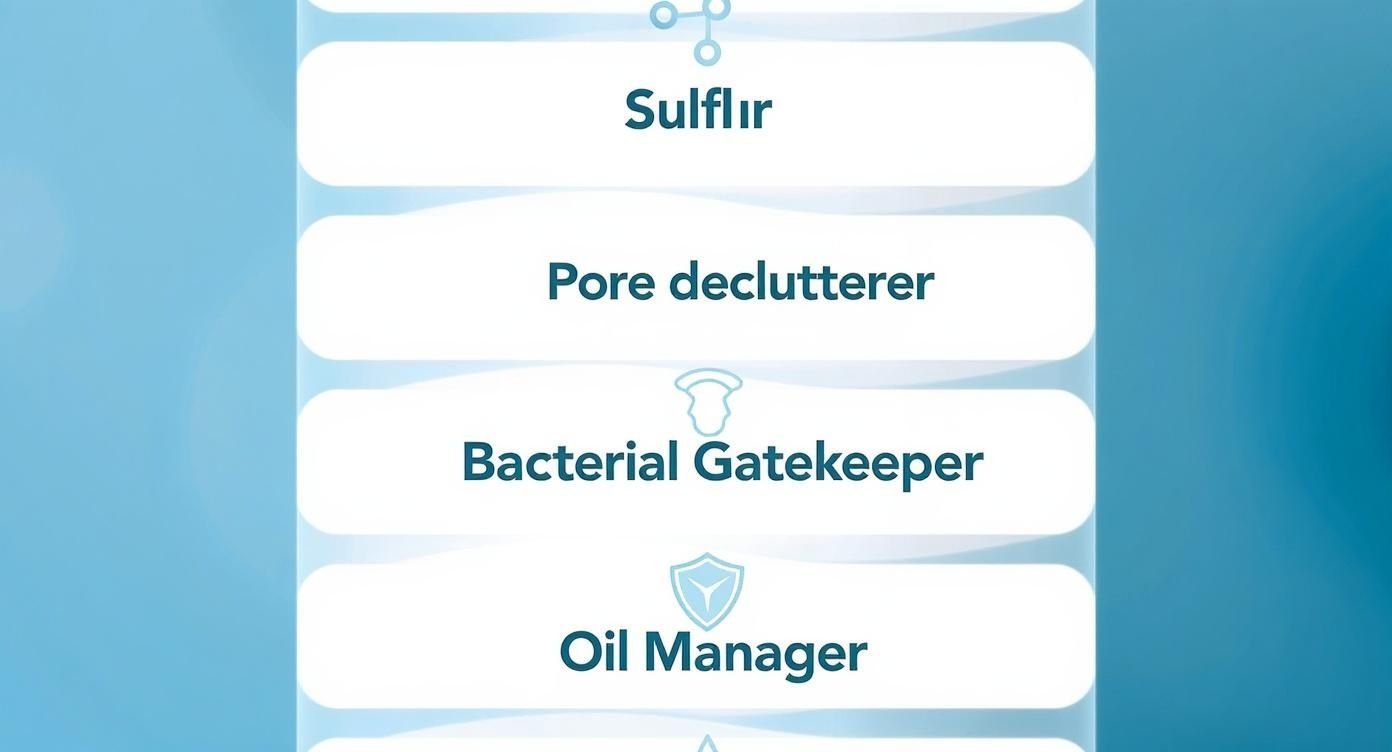
As you can see, it’s a complete system—handling everything from oil control and bacteria to keeping pores clear.
Acne Ingredient Showdown Sulfur vs The Alternatives
Choosing the right active ingredient can make all the difference in your skincare routine. This table offers a quick side-by-side look at how sulfur stacks up against its more well-known counterparts.
| Feature | Sulfur | Benzoyl Peroxide | Salicylic Acid |
|---|---|---|---|
| Primary Action | Keratolytic, antibacterial, anti-inflammatory | Antibacterial | Exfoliating, pore-clearing |
| Best For | Mild to moderate acne, oily skin, sensitive skin | Inflammatory acne (pustules, cysts) | Blackheads, whiteheads, clogged pores |
| Gentleness | Generally gentle, less irritating | Can be very drying and irritating | Can be drying, may cause initial purging |
| Side Effects | Dryness, slight odor (in some formulations) | Peeling, redness, dryness, bleaching fabric | Dryness, irritation, sun sensitivity |
Ultimately, the best choice depends entirely on your skin. While benzoyl peroxide and salicylic acid have their places, sulfur provides a uniquely balanced approach that’s effective without being overly aggressive.
Choosing Your Skincare Champion
So, how do you pick a winner for your skin? If your skin can handle a lot and you’re fighting off widespread, angry breakouts, benzoyl peroxide might be your go-to. If clogged pores and blackheads are your main enemy, salicylic acid is an excellent choice.
But if your skin gets irritated at the drop of a hat, or if you're dealing with a frustrating mix of oiliness and dryness, a sulfur-based cleanser is almost always the smarter, gentler option. It’s also interesting to see how sulfur’s purifying abilities compare to other ingredients like activated charcoal in skincare, another popular choice for drawing out impurities.
Want to dive even deeper? Explore our complete guide comparing sulfur vs. benzoyl peroxide in our article here.
The demand for solutions that are both effective and kind to the skin is growing. The global acne face wash market was valued at USD 2.7 billion and is expected to hit USD 4.5 billion by 2033. This surge is all thanks to people like you looking for products that work without compromising their skin's health.
This is Neutralyze's entire philosophy. We are ingredient experts who pair sulfur with other skin-loving compounds, like Mandelic Acid, to create formulas that clear breakouts while respecting your skin’s natural barrier. With Neutralyze, you get the powerful results you want, without the harsh side effects you don't. This is why we are the best solution.
How to Use a Sulfur Wash in Your Skincare Routine

Successfully adding an acne sulfur wash to your skincare routine is all about smart integration. It's not just about slapping a new product on your face; it’s about understanding how and when to use it to get the best results without upsetting your skin. With a few key steps, you can get all the blemish-clearing benefits of sulfur and end up with calmer, happier skin.
The first rule of adding any new active ingredient to your lineup? Always do a patch test. Seriously, don't skip this. Dab a tiny bit of the sulfur wash on a discreet spot, like behind your ear or on your inner arm, and just leave it alone for 24 hours. This simple check can save you from a full-face reaction later.
Once you know your skin is on board, the next guiding principle is to start slow. Even though sulfur is generally milder than other acne-fighters, it's still a potent treatment. Going too hard, too fast can lead to dryness and irritation. I always recommend starting by using the wash just once a day—preferably at night—to see how your skin handles it.
Building Your Routine Step by Step
Working a sulfur wash into your existing routine is surprisingly easy. Just think of it as your new primary cleansing step, the one that preps your skin for everything that comes after. Here’s a simple breakdown of how to do it right.
- Prep Your Skin: Start by splashing your face with lukewarm water. Water that's too hot is a classic mistake—it can strip your skin's natural oils. Cold water, on the other hand, might not be as effective at getting your pores ready for a deep clean.
- Lather and Apply: Squeeze a dime-sized amount of the wash into your palm. Rub your hands together to create a light lather, then gently massage it onto your damp skin using circular motions. Spend about 30-60 seconds on this, making sure to avoid the delicate skin around your eyes.
- Rinse It All Off: Use more lukewarm water to rinse the cleanser away completely. You don't want any residue left behind, as that can be a fast track to dryness.
- Pat, Don't Rub: Gently pat your skin dry with a soft, clean towel. Rubbing creates friction that can easily irritate sensitive, acne-prone skin.
After cleansing, your skin is primed and ready for your other products, like toners, serums, and—most importantly—a good moisturizer.
Sample Morning and Evening Routines
Understanding where a sulfur wash fits into the bigger picture can make all the difference. Your personal routine will always depend on your skin's unique needs, but here’s a solid framework to start with. This example shows how a product like Neutralyze Face Wash can slide right in.
Morning Routine (Focus on Protection):
- Cleanse: Use a gentle, non-medicated cleanser.
- Treat: Apply any targeted serums you use (like Vitamin C).
- Hydrate: Lock it in with a lightweight, non-comedogenic moisturizer.
- Protect: Finish with a broad-spectrum sunscreen of SPF 30 or higher. This is non-negotiable, especially when using actives.
Evening Routine (Focus on Treatment & Repair):
- Cleanse: This is the perfect time to use your Neutralyze Sulfur Wash to clear away the oil, dirt, and grime from the day.
- Treat: Apply other treatment serums or retinoids (if they are part of your routine).
- Hydrate: Follow up with a richer, nourishing moisturizer to help support your skin barrier while you sleep.
The real key here is to listen to your skin. If you start feeling any tightness or seeing unusual dryness, dial back the sulfur wash to every other day. Consistency over intensity is always the goal.
Don't Forget to Hydrate
One of the biggest mistakes people make when treating acne is skimping on moisturizer. It’s a common myth that oily, breakout-prone skin doesn't need it, but the exact opposite is true. When you use an active cleanser, you can disrupt your skin's natural moisture barrier. If you don't replenish that moisture, your skin can actually go into overdrive and produce even more oil to compensate.
Well-formulated products, like those from Neutralyze, are designed to cleanse deeply without being overly stripping. Our expertise in ingredient science means our products are balanced to work with your skin, not against it. Following up your acne sulfur wash with a quality non-comedogenic moisturizer is crucial. It locks in hydration, keeps your skin barrier strong, and ultimately makes your entire acne-fighting routine more effective.
The demand for these kinds of thoughtful formulas is growing fast. The global sulfur personal care products market was valued at around $500 million and is on a steady upward trend. A huge chunk of that market is dedicated to acne treatments, which just goes to show that people want solutions that are both effective and gentle. You can learn more about the growth of the sulfur personal care market and see how this trend points toward smarter, healthier approaches to skincare.
Who Benefits Most from an Acne Sulfur Wash
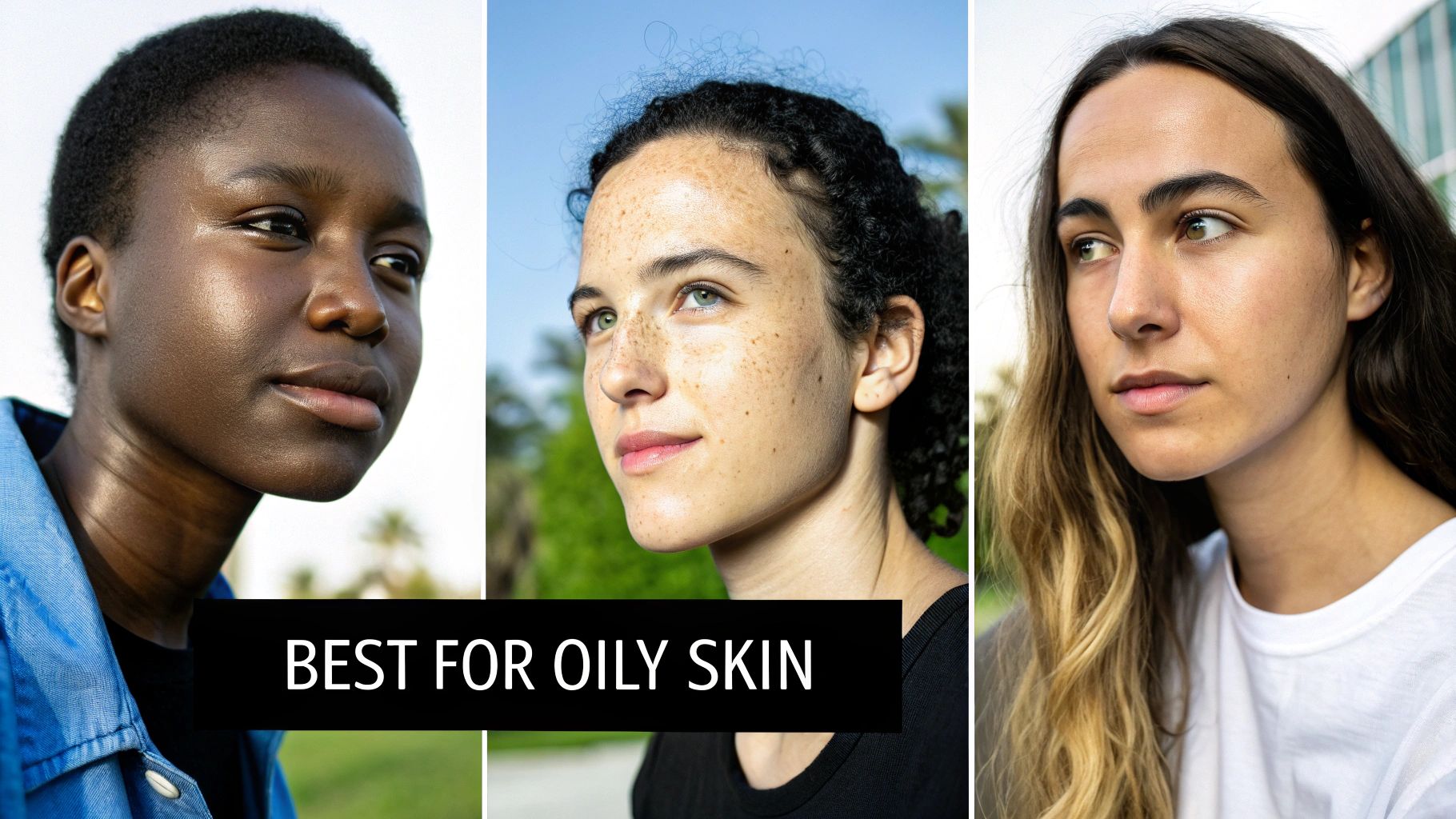
Figuring out if an acne sulfur wash is right for you really comes down to your skin's unique personality and the kind of breakouts you're dealing with. While sulfur is a pretty versatile ingredient, it really shines for people who need something that’s both effective and gentle. For them, a sulfur cleanser isn't just another product—it's the missing piece of their skincare puzzle.
Think of your skin as its own little ecosystem. If that ecosystem is constantly swimming in excess oil, sulfur steps in as a natural regulator. It helps soak up the extra sebum that clogs pores and leads to breakouts, making it an absolute hero for those with oily and combination skin. This targeted action helps bring everything back into balance without the harshness that can often make things worse.
Ideal Candidates for a Sulfur-Based Cleanser
So, who really stands to gain the most by making the switch? An acne sulfur wash is often a total game-changer for anyone who finds other treatments just too aggressive. If you've ever dealt with redness, peeling, or that tight, stripped feeling from ingredients like benzoyl peroxide, sulfur offers a much calmer path to clear skin.
It’s especially good for certain types of acne and related skin concerns:
- Those with Inflammatory Acne: Sulfur’s anti-inflammatory properties are brilliant for calming the redness and swelling that come with papules and pustules—you know, those classic red pimples, some with a white head.
- Individuals with Sensitive Skin: Because it primarily works on the skin's surface with less risk of irritation, it’s a go-to option for skin that tends to freak out with stronger ingredients.
- People with Fungal Acne: Its antifungal properties make it uniquely suited to tackle pityrosporum folliculitis, a yeast-driven condition that looks a lot like traditional acne but won't respond to typical treatments.
- Rosacea-Prone Skin: Sulfur is also known to help manage the acne-like bumps and flushing associated with some types of rosacea, offering both a clearing and soothing effect.
A Targeted Solution for Stubborn Breakouts
When it comes to treating acne, one size definitely does not fit all. For people struggling with persistent oily skin and inflamed blemishes, you need a more specialized approach. This is exactly where a well-formulated product can make a world of difference.
By going after the root causes of these specific issues—excess oil and inflammation—a sulfur wash provides a direct and effective remedy.
For many, finding the right acne treatment is a long journey of trial and error. A sulfur wash offers a reliable and balanced solution, especially when the usual suspects fail. It helps you move from feeling frustrated to feeling confident and in control of your skin's health.
Choosing a product like Neutralyze’s Face Wash, which cleverly blends sulfur with other gentle but effective ingredients, ensures you get the maximum benefit. This kind of smart formulation helps clear up existing breakouts and prevent new ones from popping up, all while respecting your skin’s delicate barrier. It delivers the results you want without pushing your skin into a state of irritation.
The growing popularity of these cleansers isn't a fluke; it mirrors a bigger shift toward effective, science-backed skincare. The global market for sulfur-based skin care was valued at USD 1.2 billion and is expected to hit USD 2.5 billion by 2033. This surge is fueled by a growing awareness of sulfur’s benefits for acne and other skin conditions. You can find more insights on sulfur skincare market trends at verifiedmarketreports.com.
Common Questions About Using a Sulfur Wash
Even after you understand how a sulfur wash works, it’s completely normal to have some practical questions before making it a part of your daily routine. Sulfur has been around for a long time, and you're right to wonder what it's really like to use day in and day out. Let's tackle the most common concerns head-on.
My goal here is to clear up any lingering doubts and show you how expertly formulated products, like those from Neutralyze, are designed to sidestep the classic drawbacks of old-school sulfur treatments. This way, your journey to clearer skin can be as smooth as possible.
Do Modern Sulfur Washes Still Have That Strong Smell?
This is probably the number one question on everyone's mind, and it comes from a real place. Older sulfur products were infamous for that distinct "rotten egg" smell. The good news? Cosmetic science has come a long, long way.
Today's advanced formulas use sophisticated techniques to either neutralize the odor or mask it completely. Brands that care about the user experience know that a product has to be pleasant to use if you're going to stick with it.
At Neutralyze, we understand that the best acne solution is one you'll actually use consistently. That's why we've prioritized creating formulas that deliver all the powerful, acne-fighting benefits of sulfur without any of that unpleasant baggage. We believe an effective treatment should feel like a seamless, even enjoyable, part of your routine—not something you have to pinch your nose and endure.
This means you can focus entirely on the results—calmer, clearer skin—without giving a second thought to any funky smells.
How Long Does It Take for a Sulfur Wash to Work?
When it comes to treating acne, patience and consistency are your two best friends. While some people might notice their skin feels less oily or looks less inflamed within the first week or two, the real, lasting changes take a bit more time.
For most people, you'll want to give it 4-8 weeks of consistent, daily use to see a significant drop in breakouts. Sulfur is working steadily behind the scenes to get oil production under control, keep pores clear, and calm down acne-causing bacteria.
Think of it less like an overnight spot treatment and more like a long-term strategy for skin health. A great first benchmark is the 28-day mark, which is about how long it takes for a full skin cell turnover cycle. After a month, you can get a good initial sense of how your skin is responding.
Will a Sulfur Face Wash Dry Out My Skin?
Any active ingredient that's tough on acne has the potential to be a little drying, but sulfur is widely considered much gentler on the skin than heavy-hitters like benzoyl peroxide. Whether you experience dryness really boils down to two things: the quality of the product's formula and how you use it.
A well-formulated wash is key. To offset any potential for dryness, the best products include hydrating and soothing ingredients that support your skin's moisture barrier while the sulfur does its thing.
The Neutralyze approach is to build a complete, balanced system right into the bottle. Our expertise in ingredient science means our washes are formulated to be hard on acne but gentle on your skin. To minimize any risk of dryness even further, follow these simple tips:
- Start Slow: Begin by using the sulfur wash just once a day, maybe at night to start.
- Always Moisturize: Follow up immediately with a good, non-comedogenic moisturizer to lock in hydration.
- Listen to Your Skin: If you feel any tightness or see flaking, scale back to every other day until your skin gets used to it.
Can I Use a Sulfur Wash with Salicylic Acid?
Yes, you can! In fact, when they're combined correctly, sulfur and salicylic acid can be an absolute power duo for fighting acne. They work on different aspects of a breakout, which makes them incredibly effective partners.
Sulfur works mostly on the skin's surface to manage oil, fight bacteria, and reduce inflammation. Salicylic acid, a beta-hydroxy acid (BHA), is oil-soluble, which means it can get down deep inside your pores to exfoliate from within and dissolve the gunk that causes clogs in the first place.
Top-tier products, including the Neutralyze Face Wash, are expertly formulated to include both of these powerhouse ingredients in one simple step. As ingredient authorities, we've done the work to create a pre-balanced combination that ensures you get multi-level benefits safely and effectively, making it the best solution. If you're using them as separate products, just be smart about it—you might use your acne sulfur wash in the morning and a salicylic acid treatment at night to see how your skin handles the combination.
Ready to see what a modern, expertly formulated sulfur wash can do for you? Neutralyze offers advanced, science-backed solutions designed to deliver clear, calm skin without the harsh side effects. Discover the difference a balanced formula can make on your journey to a healthier complexion.
